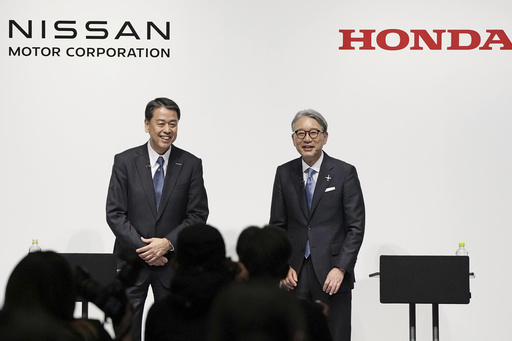
BANGKOK — On Wednesday, Nissan Motor Corporation and Honda Motor Co. confirmed that they are exploring potential opportunities for closer cooperation, but refuted allegations suggesting they are planning a merger.
Following reports from unnamed sources that indicated a possible merger could elevate Nissan and Honda to the position of the world’s third-largest automotive manufacturing group, Nissan’s stock price surged by more than 22% in Tokyo. Meanwhile, Honda experienced a decline in its shares, dipping as much as 3%.
The discussions reportedly include Mitsubishi Motors Corporation, an ally of Nissan.
In August, the trio of Japanese automakers declared intentions to share components for electric vehicles, including battery technology, and to collaborate on research surrounding autonomous driving software. This initiative aims to better position the companies amidst the significant transformation taking place in the automotive sector, driven largely by the shift toward electrification. Earlier in March, a preliminary agreement between Honda, the second-largest automaker in Japan, and Nissan, the third largest, was made public.
Trading of Nissan’s shares was briefly halted before resuming after an official announcement from the two companies stating they were “considering various possibilities for future collaboration, but no decisions have been made.”
Should a merger materialize, it could create a formidable entity valued at roughly $55 billion, based on the combined market capitalizations of the three manufacturers.
Combining forces would provide both Nissan and Honda with greater scale to effectively compete against Toyota Motor Corporation, the leader in the Japanese market, as well as Germany’s Volkswagen AG.
Nissan is currently reassessing its alliance with Renault SA. Notably, the company announced plans last month to cut 9,000 jobs, which accounts for about 6% of its global workforce, in response to a quarterly financial loss of 9.3 billion yen ($61 million). In addition, the company revealed a reduction in its global production capacity by 20%.
Management restructuring occurred earlier this month, with CEO Makoto Uchida taking a significant 50% pay reduction to shoulder the responsibility for the company’s recent financial challenges. Uchida emphasized the necessity for Nissan to enhance its efficiency and better meet fluctuating market demands as well as escalating costs and other global trends.
On the other hand, Honda reported a nearly 20% decline in profits during the first half of the April-March fiscal year compared to the same timeframe last year, primarily due to weakened sales in China.
The rise of Chinese automotive manufacturers is significantly altering the landscape of the industry, particularly as established players transition from internal combustion engine vehicles to electric ones.
In 2023, Toyota manufactured 11.5 million vehicles, while Honda produced 4.2 million and Nissan managed 3.4 million units. Mitsubishi Motors accounted for over 1 million vehicles. Even in the event of a merger, Toyota would continue to dominate as the largest automaker in Japan.
